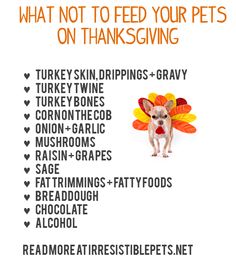Thanksgiving is a special holiday, but it can carry some hazards for pets. Follow these tips from the ASPCA to keep pets healthy and safe during the holiday.
Poison Risks
Fatty foods are hard for animals to digest. Poultry bones can damage your pet’s digestive tract. Holiday sweets can be poisonous to pets.
- Keep the feast on the table—not under it. Eating turkey or turkey skin – sometimes even a small amount – can cause a life-threatening condition in pets known as pancreatitis. Fatty foods are hard for animals to digest, and many foods that are healthy for people are poisonous to pets – including onions, raisins and grapes. If you want to share a Thanksgiving treat with your pet, make or buy a treat that is made just for them.
- No pie or other desserts for your pooch. Chocolate can be harmful to pets, even though many dogs find it tempting and will sniff it out and eat it. The artificial sweetener called xylitol – commonly used in gum and sugar-free baked goods – can also be deadly for dogs or cats.
- Yeast dough can cause problems for pets, including painful gas and potentially dangerous bloating.
- Put the trash away where your pets can’t find it. A turkey carcass sitting out on the carving table, or left in a trash container that is open or easily opened, could be deadly to your pet. Dispose of turkey carcasses and bones – and anything used to wrap or tie the meat, such as strings, bags and packaging – in a covered, tightly secured trash bag placed in a closed trash container outdoors (or behind a closed, locked door).
- Be careful with decorative plants. Some flowers and festive plants can be toxic to pets. These include amaryllis, Baby’s Breath, Sweet William, some ferns, hydrangeas and more. The ASPCA offers lists of plants that are toxic to both dogs and cats, but the safest route is simply to keep your pets away from all plants and table decorations.
- Quick action can save lives. If you believe your pet has been poisoned or eaten something it shouldn’t have, call a veterinarian or local veterinary emergency clinic immediately. You may also want to call the ASPCA Poison Control Hotline: 888-426-4435. Signs of pet distress include sudden changes in behavior, depression, pain, vomiting or diarrhea. Contact veterinarian immediately.
Precautions for parties
If hosting a party or overnight visitors, plan ahead to keep pets safe.
- Visitors can upset pets. If you know your dog or cat is nervous when people visit your home, put him/her in another room or a crate with a favorite toy. This will reduce stress on your pet and protect your guests from possible injury. If your pet is particularly upset by houseguests, consult with the veterinarian.
- Watch the exits. Even if pets are comfortable around guests, watch them closely, especially when people are entering or leaving your home. While welcoming hungry guests and collecting coats, a four-legged family member may make a break for it out the door and become lost.
- ID tags and microchips reunite families. Make sure your pet has proper identification with current contact information – particularly a microchip with up-to-date, registered information. That way, if they do sneak out, they’re more likely to be returned.
- Watch your pets around decorations. Never leave a pet alone in an area with a lit candle; it could result in a fire. And pine cones, needles and other decorations can cause intestinal blockages or even perforate an animal’s intestine if eaten.
Information from www.aspca.org.


